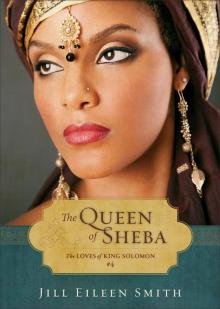- Home
- Jill Eileen Smith
Michal Page 3
Michal Read online
Page 3
“David, wait!” Michal stepped from the shadows of a row of trees that lined the walk from the palace to the barracks.
“Michal?” David tightened the leather strap around his lyre, securing it to his father’s donkey. His gaze met hers, and Michal thought her heart would stop.
She drew closer, emotions clashing within her like rival swords. “They’re still feasting. I came as soon as I could.” She drew a breath, willing her pulse to slow. “I wanted to say good-bye.”
His charismatic smile fluttered her stomach. “It appears that you already have.”
Heat burned her cheeks, and she looked down. How was it possible that he always tied her tongue in knots? She heard the swish of his sandals moving toward her.
“Take care of yourself, Princess.”
She pushed her raging emotions into a corner of her soul and met his gaze. “I will. I—we’ll miss you.”
He smiled again, making her heart skip a beat. “Perhaps we’ll meet again someday.”
Someday?
“You know my father will still need you. He shouldn’t send you off so soon. What if the demons come back tonight?”
David’s smile softened to a thoughtful expression. “Your father has a war to fight, Michal. He’ll be too busy to allow the thoughts that torment him to gain control.”
He took a step back yet was near enough for the earthy scent of him to reach her. Oh, don’t go! Stay! The words sprang to her lips, but she silenced them.
“Why does the Lord let the demons trouble my father?”
He stroked his sparse, dark brown beard, compassion evident in his tender gaze. “I don’t know, Princess.”
“It’s because he didn’t kill all of the Amalekites, isn’t it?” Michal averted her eyes. She chided herself for bringing up her father when David was leaving. She wanted to speak of love and marriage and her interest in him.
“That’s a possibility, I suppose.” He turned back to secure the donkey’s sacks. “I really couldn’t say for sure.”
“What will you do when you get home?”
David glanced at the sky and patted the donkey’s side, then looked into her eyes. Was she embarrassing him? “I’m a shepherd, Michal. I spend my days in the fields tending smelly sheep.”
“Sheep aren’t so smelly.” She toyed with the sash of her multicolored robe. Was there a shepherdess he longed to return to?
David chuckled. “You haven’t been around them much. It’s a life far less glamorous than a palace.”
Michal’s lip curled. “I’d rather live with sheep.”
She felt David’s eyes on her, and her cheeks grew warm again. “You live a privileged life, Michal. Be grateful.”
“I’d hardly call living in a dismal stone fortress with an unpredictable, hot-tempered father privileged.” The words came out harsher than she intended. “Are you betrothed, David?”
His donkey snorted, and David turned his attention to the beast. He checked the donkey’s bridle. Silence lengthened between them. Oh, to draw the words back and stuff them into her heart where they belonged. Not out in the open for him to see. She shifted from one foot to the other, wringing her folded hands. It was a foolish question and none of her business.
“Nevertheless, God has set your family above all others,” David said at last, ignoring her question. His serious tone matched the concern in his brilliant, dark brown eyes. “Which makes you fortunate.”
Michal’s stomach quivered as she held his gaze.
“If you say so.”
She watched his face take on the affection of an older brother. “I say so.” He grabbed the donkey’s reins, urging it forward. “And no, I’m not betrothed.”
Michal fixed her gaze on David’s back. In a heartbeat he turned, his eyes meeting hers. The momentary contact felt like a familiar touch, making Michal’s heart skip again. He left her staring after him, a deep ache settling in her soul. She didn’t want him to treat her like a sister. Couldn’t he see that?
“Have a safe journey, David,” she managed, fighting sudden tears. Before he rounded the bend leading through the arched gates of her father’s fortress, Michal turned and ran back to the palace.
4
Jonathan stood on the hill overlooking the Valley of Elah, bow at his side, shield in his hand. On the opposite rise, the red-feathered helmets of the Philistine army were visible among row after row of enemy tents. Even from this distance, Jonathan could see the relaxed stance and hear the boisterous laughter and taunting jibes. Israel’s old enemy was at it again, flexing their military might. In the last battle, with God’s help, Jonathan had nearly single-handedly sent them running. Where was God now?
The sun hung low on the horizon, and Jonathan braced himself as the Philistine hoard came to attention, flanking the ridge. A distant rumble, like coming thunder, shook the earth. Giant feet holding up a mammoth of a man marched with deliberate strides to the edge of the ridge.
“Why have you come out to line up for battle? Am I not a Philistine, and you the servants of Saul?” The giant’s shout caught the swift attention of his father’s army, who’d been crouched near their tents for nearly forty days. “Choose a man for yourselves, and let him come down to me. If he is able to fight with me and kill me, then we will be your servants.” The oaf paused, letting a deep laugh erupt into a sneer. “But if I prevail against him and kill him, then you shall be our servants and serve us!”
Jonathan watched his father’s men, comrades in peace and war, shrink from the hilltop back to their tents. They’d heard the same request, day after day. Why couldn’t someone step up and fight the man? Why couldn’t he?
With fingers stiff from clenching, Jonathan stuffed straight locks of hair back under his turban, out of his eyes. Courage. What had happened to his once dauntless courage? He bent to pick up a small rock and heaved it toward the valley, too far from the giant for him to notice, then turned with dogged steps toward his tent.
“Master Jonathan.” A young armor bearer ran up beside him. “The king requests you come at once.”
Now what? He turned a corner and meandered through the row of black goat-hair tents. Muted whispers drifted to his ears, but Jonathan shut them out. Never mind that his men looked at him with questioning eyes, wondering what to do. He didn’t know what they should do. If the Philistine was a normal man, he’d gear up and attack at first light. But he stood almost twice as high as most of the men of Israel. Only a fool would attempt such a thing. Or a man of great faith.
So where is your faith, Jonathan?
The question hung in the air, as though someone had spoken in his ear. Where indeed?
Lifting the flap of his father’s tent, Jonathan ducked through the opening and entered the dim interior. “You called for me, Father?”
Saul leaned against the tent post, sitting among an assortment of brown and yellow cushions. Abner, Israel’s army commander and Saul’s cousin, stood at attention. The only sign of his agitation was his right foot tapping an intermittent rhythm.
“Oh . . . we must do something, Jonathan. Do you hear what the men are saying? The whispers, the confusion. They’re talking about deserting me.”
“We need someone to take up the challenge.” Abner touched one hand to his pate, smoothing the sparse brown hair.
“I could go, Father.” Jonathan spoke the words with resignation. If he died in the process, so be it.
Silence. Then a guttural wail. “No!” Saul jumped to his feet, banging his head on the tent’s ceiling post. “I will not allow my son, heir to my throne, to be butchered by that— that—heathen pig.”
Jonathan did not care to be butchered by that heathen pig either. But he hid his thoughts. “What makes you think he’d win?” he asked.
Abner’s left brow hiked up a notch. “Don’t be ridiculous, Jonathan.”
Saul put a hand to his head and groaned. “I’ve sent for your sister.”
Jonathan stared at his father. “You’re going to feed my sister to the
giant?”
Saul shook his head. “No, no, of course not! She’s our incentive.”
Jonathan rubbed the back of his neck. “What are you talking about, Father?”
Saul fell back in a crumpled heap among the cushions and rocked back and forth. Abner walked over and placed one hand on Jonathan’s shoulder. “Your father is offering tax exemption, riches, and Merab’s hand in marriage to the slayer of Goliath. He’s sent for her. Maybe if the men see her beauty, someone will step forth.”
Jonathan shook off Abner’s hand. “You cannot bring my sister into a war camp. This is no place for a woman!” He sent a penetrating look to Abner, strode to the tent’s door, and summoned two soldiers. “Go after the men sent to bring my sister and tell them to return without her.”
“But the king said—”
“The king has changed his mind.”
The guards appeared doubtful and tried to peer beyond Jonathan into the tent.
“Now go.” Jonathan dismissed the men with a wave of his hand before turning back to his father.
“I had no choice, Jonathan,” Saul whined, still rocking back and forth, hands clasped around his knees.
“There is always a choice, Father.”
The king’s lips curved in a pout. “Well, I’m still offering her hand. Something must be done. Don’t you see?”
Yes, he did see—all too clearly. Disgusted, he turned and stepped into the gathering dusk. He was a coward, along with all of the rest of the men in the camp. And all of the money, riches, or women in the world would not change that fact.
Stacks of gray clouds shadowed the western foothills of Judah, blocking David’s view of the approaching ridge. A far-off rumble grew with every step, and David urged the donkey into a faster trot up the mountain’s winding path. The trail led through a grove of sycamore trees, and when he rounded a wide bend, the black goat-hair tents of the Israelite camp came into view. One quick glance told him the place was deserted except for a handful of sentries standing guard.
In the distance, excited shouts and stomping feet preceded a collective battle cry. David’s heart thumped, spurring him forward. He spotted a lone tent off to the right surrounded by leather packs and saddlebags. A middle-aged man stood tying a goatskin sack to the low branch of a tall oak tree. David rushed toward him.
“Are you the baggage keeper?” he asked, hopping off the donkey.
“Yes, yes. That would be me, yes.” The man turned to give David a toothless grin. “Come to watch the battle, boy?”
“Actually, I’ve come to find how the battle goes and to bring word to my father of how my brothers fare.” David handed the donkey’s reins to the man. “Are they up on the ridge?”
The man nodded. “Won’t be there long, though. Should be comin’ back to camp soon enough, if it goes like it’s been goin’. ”
David gave the man a quizzical look. “What do you mean?” He fidgeted at the sound of another earthshaking battle cry. If he didn’t hurry, the army would rush forward, and a bloodbath would begin before he had a chance to see his brothers.
The keeper stroked the donkey’s nose and shrugged. “Run along and see for yourself.”
David stepped over a sack of grain and raced around a row of tents, then sprinted the rest of the way up the hill. Row upon row of Israelite soldiers filled his vision, bordering the edge of the hill overlooking the Valley of Elah. Across the wide, green valley, columns of red-feathered helmets moved forward. Moments later they began to bob in time with the stomping feet and hoarse cries of the Philistine army. They stopped abruptly at the summit of the opposite hill.
Another returning, deafening shout erupted from the Israelites while David scanned the rows for Judah’s tribal banner and some sign of his brothers. There, four rows down, he spotted them and ran behind the battle lines to greet them.
“There you are, Shammah.”
“David!” Shammah clapped his thick arm around David’s shoulder and nearly squeezed the air from David’s lungs. “Did Father send you? Oh, tell me he sent some decent food.”
David smiled. “Some of Mother’s best bread.” He turned at a tap on his shoulder to face his second-oldest brother. “Abinadab, I’ve missed you.”
Abinadab wrapped large arms around David in a brotherly hug. “Hey, little brother! What brings you here?” He bent closer to David’s ear. “Did the king send for you again?”
David shook his head. “Father was worried. There’s been no word for over a month. What’s going on?”
Abinadab opened his mouth to speak when a collective hush fell in waves over the multiple rows of men. Across the valley a lone Philistine stepped out from the sea of heathens with red-feathered helmets and stood at the highest tip of the ridge.
“Servants of Saul.” Was that booming roar a human voice?
“Servants of Saul.” The words came clearer now, prodding David to push closer to the front lines, while the men around him took several unobtrusive steps backward.
“Why have you come out to line up for battle? Am I not a Philistine, and you the servants of Saul? Choose a man for yourselves and let him come down to me. If he is able to fight with me and kill me, then we will be your servants, but if I prevail against him and kill him, then you will be our servants and serve us.” He paused, lifted a huge spear, and shook it at the heavens. “I defy the armies of Israel this day! Give me a man, that we may fight together.”
David stared at the huge man, the Philistine’s words registering in his heart. This was no ordinary Philistine. He had to be close to six cubits and a span, covered from head to foot in plated armor. And his shield bearer was as sturdy as a brawny tree.
Yet God was bigger. Did this Philistine think his size alone could defeat the men whose God fought for them? David’s fists flexed open and closed, and he whirled about to return to his brothers, but he found the ridge suddenly deserted. He glimpsed the backs of the retreating Israelites. Where were they going? He turned back at the sound of the giant’s bellowing laugh.
“Still afraid of me, are you?” The man beat on his chest and shook his fist at the sky. “Some God you serve, Israelites! He cannot even save you from the likes of me!”
Indignation burned in David’s chest like a living, breathing fire. He spun around again and ran after the withdrawing men. Pockets of soldiers grouped by tribes huddled near their tents. David slowed his pace and approached one of them.
“What will be done for the man who kills this Philistine and takes away the reproach from Israel? For who is this uncircumcised Philistine, that he should defy the armies of the living God?”
A hardened soldier wearing the colors of the tribe of Asher folded his arms, eyeing David up and down. “I heard the king has offered his daughter’s hand in marriage.”
David faced another soldier, but the man averted his gaze as though he were ashamed. Well, he should be. David turned to a third. “Is that all he said?”
“I don’t know about a marriage proposal, but I heard there is a promise of no taxes,” the third said. “Not that it will do us any good dead.”
David jogged to another group sitting under the banner of Ephraim. “What will the king do for the man who slays this Philistine?”
“He’s promised great riches, and he’ll make him his son-in-law,” one said, scowling, then he walked off.
“If you don’t believe us, ask Prince Jonathan,” another man said. “They say he had to stop the king from bringing her to camp.” The man’s tone held disgust, matching David’s own. This was no place for a woman, least of all the beautiful, beguiling Merab. He could only imagine what would happen to her should she be taken among the spoils of war. A shudder passed through him.
The sound of shuffling feet met David’s ear. “What are you doing here, little brother?” Eliab, David’s oldest brother, grabbed the back of David’s tunic and spun him around, pulling him close and nearly spitting in his face. “And with whom have you left those few sheep in the wilderness? I know your
pride and your wicked heart. You came to see the battle.”
Irritation spread through David, and he shoved both hands against Eliab’s chest, breaking free of his grip. “What have I done now? Is there not a cause?” His gaze met the burning coals of Eliab’s hardened eyes.
“Your questions aren’t helping anything.” He straightened his shoulders and tossed David a final, haughty glare. “Do not make a nuisance of yourself, little brother.” He stomped off.
David lifted his chin and stared after Eliab. His brother would never change. If anything, he’d only become more antagonistic since David’s anointing by the prophet Samuel. Must he always meet with such opposition?
He walked on to the next tribe and came upon a group of Benjamites about a stone’s throw from the ornate tent of the king. Armed guards stood watch outside, and servants scurried about, carrying skins of wine and trays of roasted meat into the tent. Something was seriously wrong here. Saul should be walking among his men, encouraging them, seeking the Lord’s guidance in what to do about this Philistine.
“Has the king consulted with the priests to determine the will of the Lord?” David asked a man who sat in front of his tent hugging his knees to his chest. He knew the prophet Samuel wouldn’t be coming. Samuel had told him months ago that he would no longer appear in Saul’s court or anywhere else in the vicinity of the king.
The man lifted troubled eyes to David, and his shoulders slumped in a deep sigh. “The king has offered riches, tax exemption, and his daughter’s hand in marriage to the slayer of Goliath.”
“Goliath?” So that was his name.
“Goliath of Gath. They say he’s one of the sons of Anak.” He studied his feet. “He’s too strong for us, you know. There isn’t a man in Israel who comes close to his height. Not even the king.”
King Saul was well known for his stature in Israel, towering head and shoulders above most men. Yet David bristled, the hairs on his arms prickling his flesh. What difference did a man’s height make? “The Lord is on our side,” he said, straightening. “We have nothing to fear.”

 Star of Persia: Esther's Story
Star of Persia: Esther's Story The Shepherdess
The Shepherdess Abigail (The Wives of King David Book #2): A Novel
Abigail (The Wives of King David Book #2): A Novel The Queen of Sheba
The Queen of Sheba Michal
Michal Rebekah
Rebekah A Passionate Hope--Hannah's Story
A Passionate Hope--Hannah's Story Daughter of the Nile
Daughter of the Nile Rachel
Rachel Sarai
Sarai Redeeming Grace: Ruth's Story
Redeeming Grace: Ruth's Story The Desert Princess
The Desert Princess The Prophetess - Deborah's Story
The Prophetess - Deborah's Story